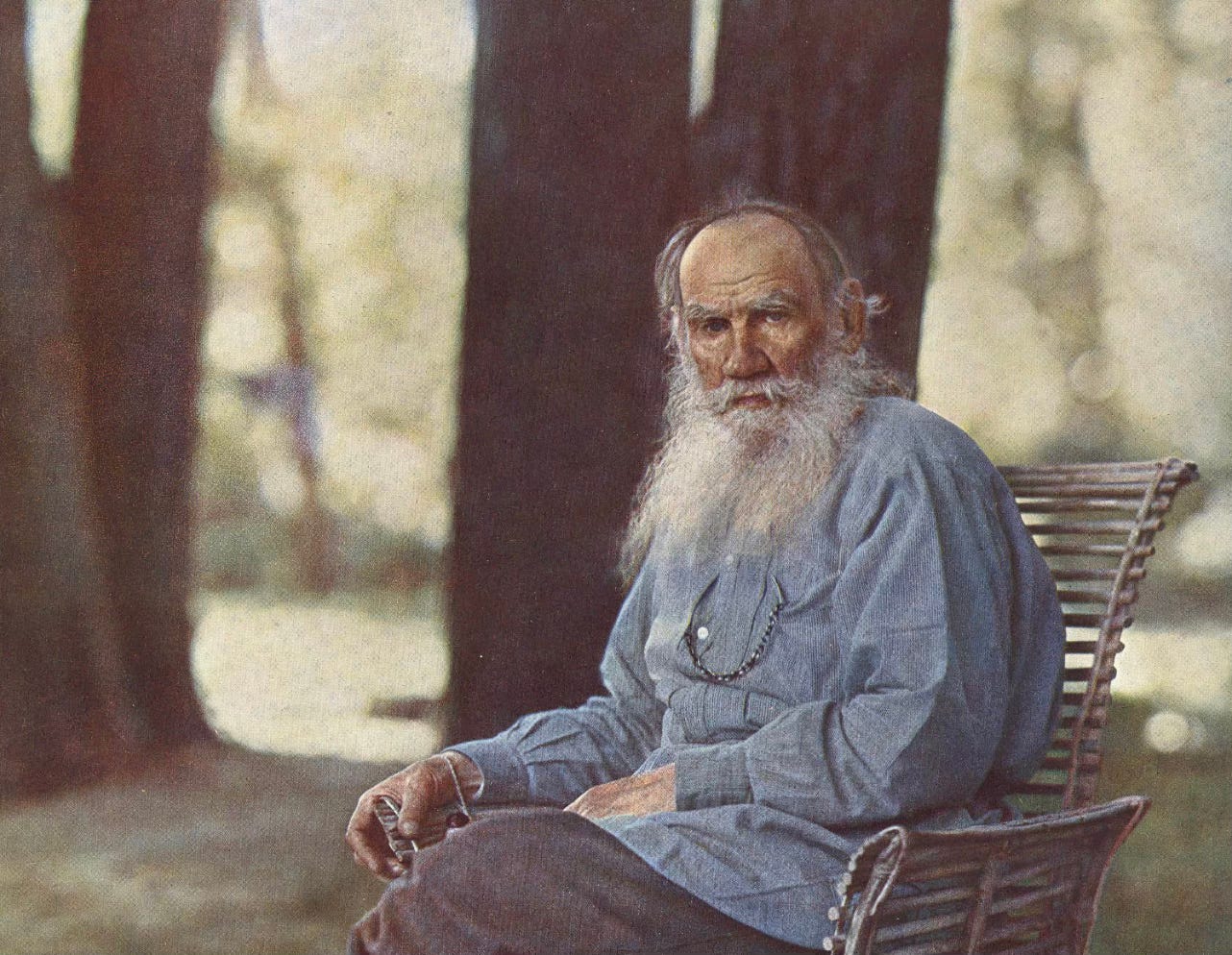Leo Tolstoy: The wisdom & meaning of life

Jun 19, 2024

Leo Tolstoy
The Genius of Leo Tolstoy: The Meaningful Life
Leo Tolstoy is considered one of the greatest writers of all time. His novels, including “War and Peace,” “Anna Karenina”, and “The Death of Ivan Ilyich,” are well known and have been translated into dozens of languages.
Leo Tolstoy maintained a deep commitment to simple living and ethical principles. He focused on what was important — family, friends, love for others, reading books, learning new things — and not on material things or personal vanity.
Leo Tolstoy was plagued by existential crises throughout his life. His unhappiness took the form of asceticism, leading him to give up all his worldly possessions, leaving him unhappy with that decision too.
This led to further soul-searching, pondering the meaning of life and writing an epic trilogy about it. The result is some of the most profound literary insight into what it means to be human; that we are not simply the people we appear to be on the surface but something much deeper underneath.
“I looked more widely around me, I studied the lives of the masses of humanity, and I saw that, not two or three, or ten, but hundreds, thousands, millions, had so understood the meaning of life that they were able both to live and to die. All these people were well acquainted with the meaning of life and death, quietly labored, endured privation and suffering, lived and died, and saw in all this, not a vain, but a good thing.” — Leo Tolstoy
He questioned the very essence of life and wrote:
“My question … was the simplest of questions, lying in the soul of every man from the foolish child to the wisest elder: it was a question without an answer to which one cannot live, as I had found by experience. It was: “What will come of what I am doing today or shall do tomorrow? What will come of my whole life?” Differently expressed, the question is: “Why should I live, why wish for anything, or do anything?” It can also be expressed thus: “Is there any meaning in my life that the inevitable death awaiting me does not destroy?”
Tolstoy was a great thinker, philosopher, and social reformer. His works influenced many writers and thinkers of his time. His novels are filled with life lessons on how to live a happy life. He believed that human beings are essentially good but can be corrupted by society and society’s institutions, including religion. He criticized organized religion for encouraging people to think only in terms of salvation, rather than embracing their full humanity.
Tolstoy also believed that social hierarchies are inherently unjust. He saw war as an inevitable part of human nature, but he believed it could be avoided if people learned to live together peacefully.
Tolstoy’s philosophical views were influenced by his Christian beliefs and his experiences as a soldier during the Russian Civil War. Tolstoy was an avid reader, writing in his journal daily, so the lessons he learned from the books he read are evident in his writing. Tolstoy’s philosophical lessons can be seen in his character Anna Karenina’s pursuit of happiness and her desire to find meaning in life.
Your first purpose is to understand yourself
Tolstoy thought your first responsibility in life is to understand your purpose, meaning and yourself. By striving to understand yourself and others, you can live your life to the fullest.
His ideas on living a meaningful life can be summarized in three principles: Be happy, be kind, and be useful. Being happy means finding joy in your daily life. It means developing good relationships with other people.
Being kind means treating everyone with respect. Being useful means contributing to society in some way. Following these principles can make your life more fulfilling and meaningful.
“It seems that it is impossible to live without discovering the purpose of your life. And the first thing which a person should do is to understand the meaning of life. But the majority of people who consider themselves to be educated are proud that they have reached such great height that they cease to care about the meaning of existence,” he said.
People usually think that progress consists in the increase of knowledge alone. Tolstoy believed that real progress consists only in the greater clarification of answers to the fundamental questions of life.
He also believed that true fulfilment came from doing work you were passionate about. He encouraged people to “live your life as if it were a work of art” and to do their best no matter what situation they found themselves in.
“If you do not know your place in the world and the meaning of your life, you should know there is something to blame; and it is not the social system, or your intellect, but the way in which you have directed your intellect.” — Leo Tolstoy
He also stressed the importance of taking time for yourself every day, whether for meditation or exercise. By prioritizing your own well-being, you’ll be able to better care for others when the time comes.
What makes you happy doesn’t have to make sense to everyone
One of Tolstoy’s key lessons is that happiness is not about getting everything you want all the time. He believed people should do what makes them happy, even if it doesn’t make sense to everyone else.
“Seize the moments of happiness, love and be loved! That is the only reality in the world, all else is folly. It is the one thing we are interested in here,” he argued. He thought people should live passionately and authentically. If you can’t find meaning in your life, it’s easy to feel unhappy. But you can find peace even in difficult times by learning to accept things as they are.
Tolstoy also believed that people should treat each other with respect. He thought that when you treat others well, they will return the favour. This can lead to better relationships and happier life for everyone involved. “The sole meaning of life is to serve humanity,” he remarked.
Knowledge of the world can help you build a good career. Knowledge of yourself can help you find meaning and happiness. A good balance of the two is key to fulfilment in life.
“Real wisdom is not the knowledge of everything, but the knowledge of which things in life are necessary, which are less necessary, and which are completely unnecessary to know,” Tolstoy said.
In your quest for a better life, remember, “time is an illusion in life; the life of the past and the future clouds men from the true life of the present.” Choose to live now.
Source: https://postanly.substack.com/p/leo-tolstoy-the-wisdom-and-meaning


Write a Reply or Comment